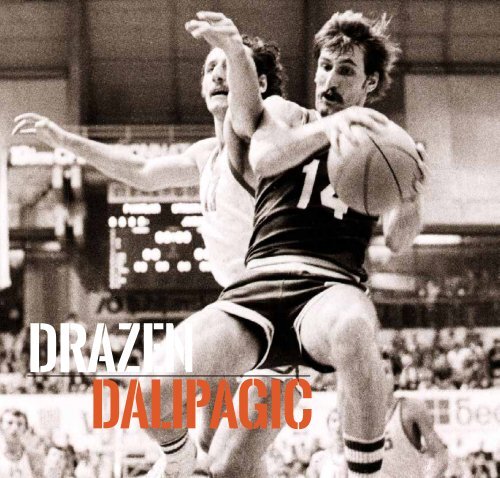Create successful ePaper yourself
Turn your PDF publications into a flip-book with our unique Google optimized e-Paper software.
Drazen<br />
Dalipagic<br />
79
The sky jumper<br />
The history <strong>of</strong> Drazen Dalipagic is not<br />
your typical one, in which a great young<br />
talent has a brilliant junior career, then<br />
explodes later as a senior and meets all<br />
expectations. Simply put, Dalipagic was<br />
always a senior because at the age when<br />
Kresimir Cosic, Dragan Kicanovic, Zoran Slavnic,<br />
Mirza Delibasic and the rest were exploding into basketball<br />
and well before he would join them and form a<br />
great Yugoslavian national team, Dalipagic was playing<br />
... football. His nickname precisely comes from his<br />
football days. A central defender <strong>of</strong> FC Velez Mostar<br />
was called Prajo – and for some reason, Dalipagic also<br />
took that name, which in Belgrade would later become<br />
“Praja” (pronounced, pra-ya).<br />
Dalipagic, who was born on November 27, 1951 in<br />
Mostar, Bosnia and Herzegovina, came into basketball<br />
by chance. But with a talent for all ball sports, he soon<br />
became the best player in Lokomotiva, the local team<br />
from Mostar. His talent took him to the Bosnia-Herzegovina<br />
national team, with whom, in a tourney played<br />
in Zvornik <strong>of</strong> his native country, he destroyed Serbia in<br />
front <strong>of</strong> Ranko Zeravica, then the coach <strong>of</strong> Yugoslavia<br />
and the future Partizan coach starting in 1972. What<br />
Zeravica saw in Dalipagic was already known among<br />
Yugoslav scouts. Everybody wanted to sign him. Jugoplastika<br />
took the lead in that race and the young player<br />
even got some advance money from the deal. But Partizan<br />
persevered. At the end <strong>of</strong> the 1970-71 season, Partizan<br />
descended into the second division, but thanks to<br />
a change in the competition system, the team got back<br />
to the first division for the start <strong>of</strong> the next one because<br />
the second division had been played through the summer.<br />
Djordje Colovic, a smart Partizan man, convinced<br />
Dalipagic to travel to Belgrade by telling him about the<br />
club’s big plans to build a great team with Zeravica on<br />
the bench. Dalipagic would only accept under one condition:<br />
that Partizan was back in the first division. When<br />
Partizan met its side <strong>of</strong> the deal, Dalipagic did the same,<br />
even though breaking his agreement with Jugoplastika<br />
cost the player a six-month suspension from the Bosnian<br />
federation. He made his debut on the road against<br />
Zadar with only 3 points. But in the debut in front <strong>of</strong> his<br />
own fans, against Lokomotiva Zagreb (the future Cibona),<br />
he scored 21. That was the start <strong>of</strong> a brilliant career<br />
that would end at Crvena Zvezda in the 1990-91 season<br />
with the legendary Praja at 39 years <strong>of</strong> age.<br />
Shoot and jump<br />
Praja was not as talented as Cosic, as imaginative<br />
as Kicanovic, as elegant as Delibasic or as smart on the<br />
court as Slavnic. But he had two things that turned him<br />
into one <strong>of</strong> the best scorers ever. He could shoot and rebound.<br />
Or jump and shoot. Two inseparable elements.<br />
He jumped to grab the ball, he jumped to take a shot,<br />
especially from the corner, his favorite spot. We can add<br />
a third element, related to rebounds: dunks. His were<br />
spectacular, a combination <strong>of</strong> strength, quickness, confidence<br />
and, also, a great understanding with Dragan<br />
Kicanovic, who dished special assists to make Praja’s<br />
alley-oops easier. The press in Belgrade nicknamed him<br />
“The Sky Jumper”.<br />
After the 1972 Olympic Games in Munich, Zeravica<br />
left the national team to build a great Partizan. Dalipagic<br />
was the first piece <strong>of</strong> the puzzle. In 1973, Kicanovic<br />
joined the team, and one <strong>of</strong> the best Yugoslavian<br />
<strong>101</strong> greats <strong>of</strong> european basketball<br />
Drazen Dalipagic<br />
D
Vladimir Stankovic<br />
basketball duos ever was born. The successor to Zeravica<br />
for the national team bench was Mirko Novosel,<br />
his assistant. For the 1973 EuroBasket in Barcelona,<br />
Novosel started a revolution: aside from the veterans<br />
like Cosic, Rato Tvrdic, Damir Solman, Vinko Jelovac<br />
and Nikola Plecas, he called Dalipagic, Kicanovic, Zeljko<br />
Jerkov, Dragan Ivkovic, Zoran Marovic and Slavnic, already<br />
a veteran at 24 whom Zeravica had not counted<br />
on. The outcome was spectacular: Yugoslavia’s first<br />
gold medal in a EuroBasket and the start <strong>of</strong> an era that<br />
would peak with the gold medal at the 1980 Olympics<br />
in Moscow. The core <strong>of</strong> this brilliant team was formed<br />
by Cosic (born in 1948), Slavnic (1949), Dalipagic (1951)<br />
and Kicanovic (1953). As can be seen, they were not<br />
from the same generation, but they connected on the<br />
court. They played in four different positions and they<br />
only needed a fifth man to form an unstoppable starting<br />
five. Usually, the fifth man was center Zeljko Jerkov.<br />
Owner <strong>of</strong> 12 medals<br />
When distributing roles, Praja had always the toughest<br />
one: scoring as much as possible. He started in Barcelona<br />
in 1973 with an average <strong>of</strong> 8 points per game. In<br />
Belgrade 1975 he had 12.1. Then came Montreal 1976<br />
(18.2 ppg.), Belgium 1977 (19.8), Manila 1978 (22.4) and<br />
Turin 1979 (14.0), Moscow 1980 (24.4), Prague 1981<br />
(17.0), Columbia 1982 (18.1), Nantes 1983 (18.3), Los<br />
Angeles 1984 (21.9) and Madrid 1986 (16.2). During<br />
his 13 years with the national team, in the three great<br />
competitions – EuroBasket, the World Cup, and the<br />
Olympic Games – he won 12 medals: 5 golds, 3 silvers<br />
and 4 bronzes. He played 246 games and scored 3,700<br />
points, 400 more than second-in-line Kicanovic and<br />
520 more than the third-best scorer, Cosic. Only Cosic,<br />
with 14, has more medals than Dalipagic. His scoring<br />
high for the national team was 46 points against Romania<br />
in 1976, the second-best mark ever on the team,<br />
surpassed only by Drazen Petrovic’s 47 points against<br />
the Netherlands in 1986.<br />
In his 10 years at Partizan, Dalipagic played a total<br />
<strong>of</strong> 305 games, scored 8,278 points (27.1 per game)<br />
and won two national leagues, one domestic cup and<br />
one Korac Cup, in 1976. He also played in Italy for<br />
Venezia, Udine and Verona, totaling 241 games with<br />
7,993 points and 47.1% three-point shooting. He was<br />
top scorer in Italy three times, with averages <strong>of</strong> 30.8,<br />
36.5 and 36.3 points per game. On January 25, 1987,<br />
playing for Venezia against Virtus Bologna (107-102) he<br />
scored ... 70 points! In Venezia, in the second division,<br />
his average for the 1981-82 season was ... 42.9 points!<br />
In the 1982-83 season, he played for Real Madrid, but<br />
only in the EuroLeague. In that team, he met fellow Bosnian<br />
Mirza Delibasic.<br />
At 39, Dalipagic accepted the call from his great<br />
friend Moka Slavnic, coach <strong>of</strong> Crvena Zvezda, for the<br />
1990-91 season and he didn’t disappoint. He scored<br />
321 points and his three-point accuracy was 38%. The<br />
esteemed players who achieved more than him that<br />
season are: Arian Komazec <strong>of</strong> Zadar was the best scorer<br />
(645), Zarko Paspalj <strong>of</strong> Partizan second (576), Toni<br />
Kukoc third (438). The best shooters from downtown<br />
were Zeljko Obradovic <strong>of</strong> Partizan (58.5%) and Velimir<br />
Perasovic <strong>of</strong> Jugoplastika (50%).<br />
Dalipagic could have been the first <strong>European</strong> in<br />
the NBA. After the Montreal Olympics in 1976, where<br />
Yugoslavia lost the final to the USA, the Boston Celtics<br />
called Praja. He spent two weeks in their summer camp<br />
and convinced everyone. But signing for an NBA team<br />
would mean losing his “amateur” status, which would<br />
deprive him <strong>of</strong> playing with Yugoslavia in FIBA competi-<br />
80<br />
81
After all, he was named the <strong>European</strong> player <strong>of</strong> the year<br />
three times - in 1977, 1978 and 1980!<br />
After his great playing career, Praja coached Gorizia<br />
<strong>of</strong> Italy for several years, and then was sports director<br />
from some humble teams <strong>of</strong> Belgrade. More recently, he<br />
has been living away from basketball. His son Davorin<br />
followed his footsteps and was a pro in Portugal, Italy,<br />
Cyprus and even played for Partizan for a short stint.<br />
But the weight <strong>of</strong> his name was too big despite him being<br />
a fine player.<br />
Because his father was too great.<br />
Drazen Dalipagic<br />
tions. It was too big a sacrifice for such a patriotic player.<br />
I think that, because <strong>of</strong> his playing style, his physical<br />
strength, his scoring and rebounding abilities, he would<br />
have been able to play in the NBA without a doubt. The<br />
<strong>European</strong> pioneers (Sarunas Marciulionis, Vlade Divac,<br />
Alexander Volkov, Drazen Petrovic) confirmed the <strong>European</strong><br />
potential some 10 years later. His greatness was<br />
recognized when Dalipagic was inducted into the Naismith<br />
Memorial <strong>Basketball</strong> Hall <strong>of</strong> Fame on September<br />
10, 2004. FIBA did the same on September 12, 2007.<br />
<strong>101</strong> greats <strong>of</strong> european basketball<br />
D

















